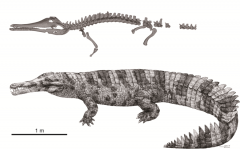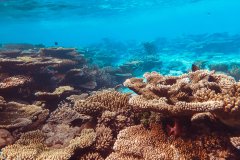Darwin in a lab: Coral evolution tweaked for global warming
Scientists are trying to speed up coral’s evolutionary clock to build reefs that can better withstand the impacts of global warming
December 10, 2021, 12:09 AM
7 min read
Share to FacebookShare to TwitterEmail this articleCOCONUT ISLAND, Hawaii -- On a moonless summer night in Hawaii, krill, fish and crabs swirl through a beam of light as two researchers peer into the water above a vibrant reef.
Minutes later, like clockwork, they see eggs and sperm from spawning coral drifting past their boat. They scoop up the fishy-smelling blobs and put them in test tubes.
In this Darwinian experiment, the scientists are trying to speed up coral’s evolutionary clock to breed “super corals” that can better withstand the impacts of global warming.
For the past five years, the researchers have been conducting experiments to prove their theories would work. Now, they're getting ready to plant laboratory-raised corals in the ocean to see how they survive in nature.
“Assisted evolution started out as this kind of crazy idea that you could actually help something change and allow that to survive better because it is changing,” said Kira Hughes, a University of Hawaii researcher and the project's manager.
SPEEDING UP NATURE
Researchers tested three methods of making corals more resilient:
— Selective breeding that carries on desirable traits from parents.
— Acclimation that conditions corals to tolerate heat by exposing them to increasing temperatures.
— And modifying the algae that give corals essential nutrients.
Hughes said the methods all have proven successful in the lab.
And while some other scientists worried this is meddling with nature, Hughes said the rapidly warming planet leaves no other options. “We have to intervene in order to make a change for coral reefs to survive into the future,” she said.
When ocean temperatures rise, coral releases its symbiotic algae that supply nutrients and impart its vibrant colors. The coral turns white — a process called bleaching — and can quickly become sick and die.
For more than a decade, scientists have been observing corals that have survived bleaching, even when others have died on the same reef.
So, researchers are focusing on those hardy survivors, hoping to enhance their heat tolerance. And they found selective breeding held the most promise for Hawaii's reefs.
“Corals are threatened worldwide by a lot of stressors, but increasing temperatures are probably the most severe,” said Crawford Drury, chief scientist at Hawaii’s Coral Resilience Lab. “And so that’s what our focus is on, working with parents that are really thermally tolerant.”
A NOVEL IDEA
In 2015, Ruth Gates, who launched the resilience lab, and Madeleine van Oppen of the Australian Institute of Marine Science published a paper on assisted evolution during one of the world's worst bleaching events.
The scientists proposed bringing corals into a lab to help them evolve into more heat-tolerant animals. And the idea attracted Microsoft co-founder Paul Allen, who funded the first phase of research and whose foundation still supports the program.
“We’ve given (coral) experiences that we think are going to raise their ability to survive,” Gates told The Associated Press in a 2015 interview.
Gates, who died of brain cancer in 2018, also said she wanted people to know how “intimately reef health is intertwined with human health.”
Coral reefs, often called the rainforests of the sea, provide food for humans and marine animals, shoreline protection for coastal communities, jobs for tourist economies and even medicine to treat illnesses such as cancer, arthritis and Alzheimers disease.
A recent report from the National Oceanic and Atmospheric Administration and other research organizations concluded bleaching events are the biggest threat to the world's coral reefs. Scientists found that between 2009 and 2018, the world lost about 14% of its coral.
Assisted evolution was not widely accepted when first proposed.
Van Oppen said there were concerns about losing genetic diversity and critics who said the scientists were “playing gods” by tampering with the reef.
“Well, you know, (humans) have already intervened with the reef for very long periods of time,” van Oppen said. “All we’re trying to do is to repair the damage.”
Rather than editing genes or creating anything unnatural, researchers are just nudging what could already happen in the ocean, she said. “We are really focusing first on as local a scale as possible to try and maintain and enhance what is already there."
MILLIONS OF YEARS IN THE MAKING
Still, there are lingering questions.
“We have discovered lots of reasons why corals don’t bleach," said Steve Palumbi, a marine biologist and professor at Stanford University. “Just because you find a coral that isn’t bleaching in the field or in the lab doesn’t mean it’s permanently heat tolerant.”
Corals have been on Earth for about 250 million years and their genetic code is not fully understood.










